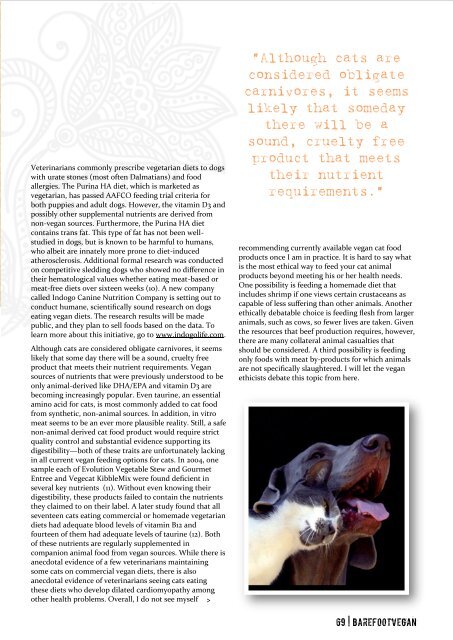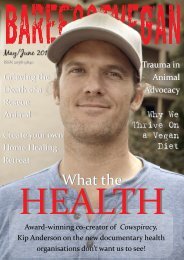barefoot vegan sept_oct issue.pdf
- No tags were found...
Create successful ePaper yourself
Turn your PDF publications into a flip-book with our unique Google optimized e-Paper software.
Veterinarians commonly prescribe vegetarian diets to dogs<br />
with urate stones (most often Dalmatians) and food<br />
allergies. The Purina HA diet, which is marketed as<br />
vegetarian, has passed AAFCO feeding trial criteria for<br />
both puppies and adult dogs. However, the vitamin D3 and<br />
possibly other supplemental nutrients are derived from<br />
non-<strong>vegan</strong> sources. Furthermore, the Purina HA diet<br />
contains trans fat. This type of fat has not been wellstudied<br />
in dogs, but is known to be harmful to humans,<br />
who albeit are innately more prone to diet-induced<br />
atherosclerosis. Additional formal research was conducted<br />
on competitive sledding dogs who showed no difference in<br />
their hematological values whether eating meat-based or<br />
meat-free diets over sixteen weeks (10). A new company<br />
called Indogo Canine Nutrition Company is setting out to<br />
conduct humane, scientifically sound research on dogs<br />
eating <strong>vegan</strong> diets. The research results will be made<br />
public, and they plan to sell foods based on the data. To<br />
learn more about this initiative, go to www.indogolife.com.<br />
Although cats are considered obligate carnivores, it seems<br />
likely that some day there will be a sound, cruelty free<br />
product that meets their nutrient requirements. Vegan<br />
sources of nutrients that were previously understood to be<br />
only animal-derived like DHA/EPA and vitamin D3 are<br />
becoming increasingly popular. Even taurine, an essential<br />
amino acid for cats, is most commonly added to cat food<br />
from synthetic, non-animal sources. In addition, in vitro<br />
meat seems to be an ever more plausible reality. Still, a safe<br />
non-animal derived cat food product would require strict<br />
quality control and substantial evidence supporting its<br />
digestibility—both of these traits are unfortunately lacking<br />
in all current <strong>vegan</strong> feeding options for cats. In 2004, one<br />
sample each of Evolution Vegetable Stew and Gourmet<br />
Entree and Vegecat KibbleMix were found deficient in<br />
several key nutrients (11). Without even knowing their<br />
digestibility, these products failed to contain the nutrients<br />
they claimed to on their label. A later study found that all<br />
seventeen cats eating commercial or homemade vegetarian<br />
diets had adequate blood levels of vitamin B12 and<br />
fourteen of them had adequate levels of taurine (12). Both<br />
of these nutrients are regularly supplemented in<br />
companion animal food from <strong>vegan</strong> sources. While there is<br />
anecdotal evidence of a few veterinarians maintaining<br />
some cats on commercial <strong>vegan</strong> diets, there is also<br />
anecdotal evidence of veterinarians seeing cats eating<br />
these diets who develop dilated cardiomyopathy among<br />
other health problems. Overall, I do not see myself ><br />
“Although cats are<br />
considered obligate<br />
carnivores, it seems<br />
likely that someday<br />
there will be a<br />
sound, cruelty free<br />
product that meets<br />
their nutrient<br />
requirements.”<br />
recommending currently available <strong>vegan</strong> cat food<br />
products once I am in practice. It is hard to say what<br />
is the most ethical way to feed your cat animal<br />
products beyond meeting his or her health needs.<br />
One possibility is feeding a homemade diet that<br />
includes shrimp if one views certain crustaceans as<br />
capable of less suffering than other animals. Another<br />
ethically debatable choice is feeding flesh from larger<br />
animals, such as cows, so fewer lives are taken. Given<br />
the resources that beef production requires, however,<br />
there are many collateral animal casualties that<br />
should be considered. A third possibility is feeding<br />
only foods with meat by-products for which animals<br />
are not specifically slaughtered. I will let the <strong>vegan</strong><br />
ethicists debate this topic from here.<br />
69 | BarefootVegan





